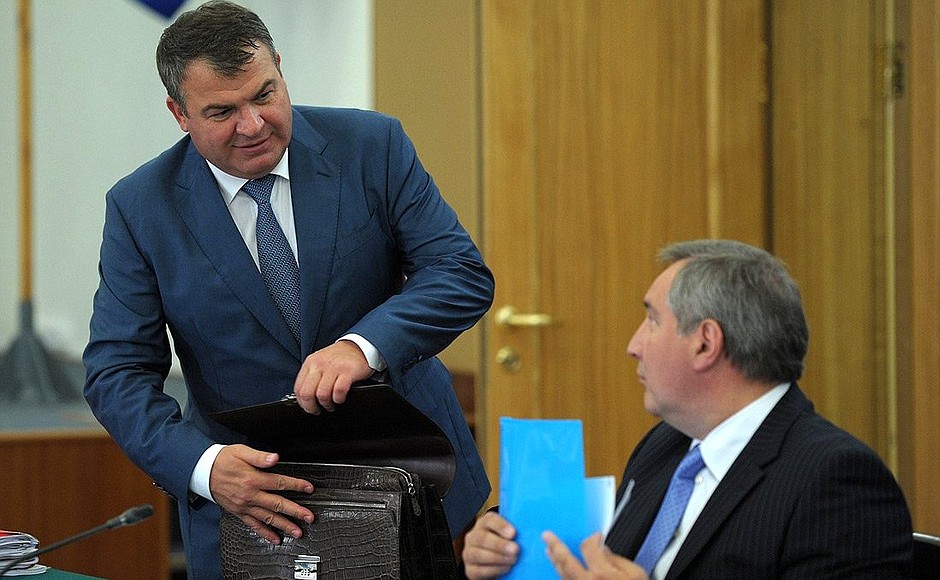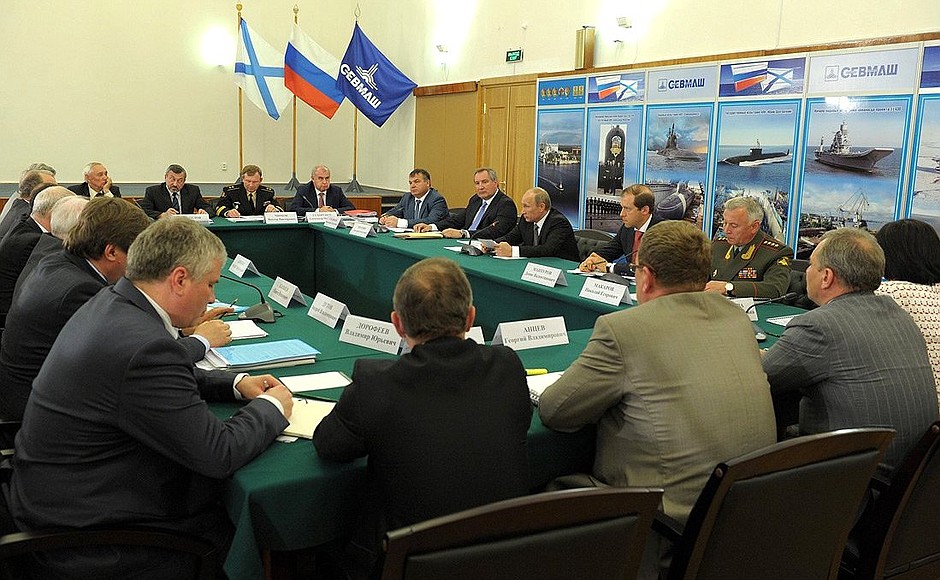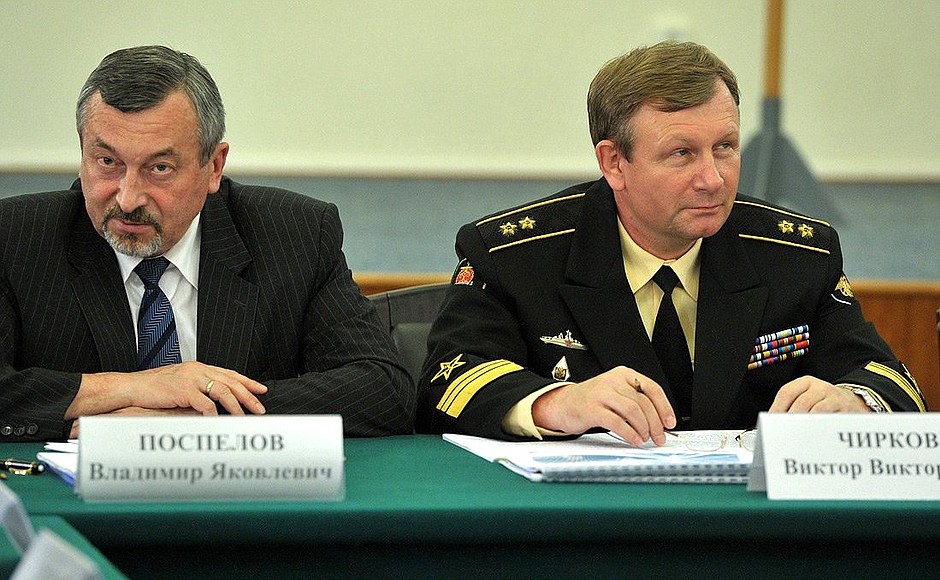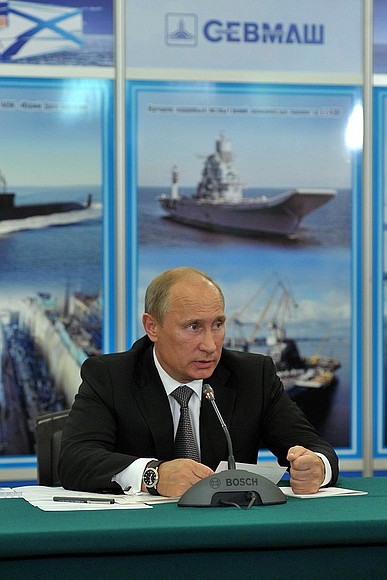The President continued a series of meetings on implementing state armament programme. Earlier, Vladimir Putin held meetings on supplying weapons to the Strategic Nuclear Forces and the Aerospace Defence Troops, Land Forces and Airborne Troops.
* * *
Opening remarks at the meeting on implementing state armament programme for the Navy
President of Russia Vladimir Putin: Colleagues, good evening,
Today, we are holding the fourth of our planned meetings on implementing the state armament programme. Severodvinsk is a natural location for addressing these types of issues, so we will talk about our progress in supplying modern technology and weapons to the Navy.
As you recall, we approved the Fundamental Principles of the State Policy for the Navy through to 2020 on May 29 of this year. These principles establish a system of measures to ensure Russian’s national security and protect its national interests in the global oceans.
We feel our nation must maintain and strengthen its status as one of the world’s leading naval powers. At the same time, our Navy must have the opportunity to efficiently resolve a broad set of challenges.
First and foremost, we are talking about developing the maritime component of our strategic nuclear forces and the fleet’s participation in maintaining global parity.
Moreover, this means creating multipurpose maritime groupings capable of efficiently fending off military threats in the seas, ensuring the security of transport communication and defending merchant vessels, as well as efficiently fighting piracy.
The Navy is an instrument for defending our national economic interests, including in regions like the Arctic, which holds a rich concentration of bio-resources, as well as deposits of hydrocarbons and other natural resources.
We recently examined issues pertaining to the Navy’s strategic component, during a previous meeting on our strategic nuclear forces and aerospace defence troops. I repeat again, we have sufficient sea-based nuclear potential, and by 2020, it will be substantially upgraded by introducing eight new Borei-class nuclear-powered submarines.
As you know, the first vessel, the Yury Dolgoruky submarine, is completing trials. The second, Alexander Nevsky, is undergoing factory trials. And today, here at Sevmash, we held a laying-down ceremony for a new nuclear submarine, Knyaz Vladimir. I hope that the entire eight-submarine project will be carried out at the proper level, in accordance with the corresponding quality standards and deadlines.
Today, I propose that we have a more detailed discussion on creating a qualitatively new image for the general-purpose naval forces. We are allotting very significant funding for these goals, in accordance with the state armament programme – almost four and a half trillion rubles, or to be more precise, 4.44 trillion rubles, which is 23.4 percent of the total programme volume until 2020. And about one third of these funds will be paid out to contractors over the course of the next five years.
Most of the allocations will be spent on the procurement of new equipment. This will allow us to bring the share of modern armaments and equipment in the general-purpose naval forces up to 30 percent by 2016, and to 70 percent by 2020. At the same time, I want to stress that one of our absolute priorities is to create well-balanced naval groupings equipped with high-precision long-range weapons.
By 2020, the fleet will have 51 modern warships, as well as 16 multipurpose submarines. Please note that this does not include the eight strategic nuclear submarines I mentioned earlier.
At the same time, 49 new ships and all submarines will be built only at Russian shipyards. Our own domestic industry will fulfil nearly all our orders. This is a serious responsibility. We will set very strict quality requirements and deadlines.
You are all aware of the problems and difficulties involved in fulfilling the state defence order in recent years, including for naval armaments. The reasons for this are well-known. The main problem is that the Defence Ministry and defence companies were unable to come to a timely agreement on prices, deadlines, and delivery volumes. As a result, the Navy failed to receive three warships in 2011.
Granted, the situation is gradually improving. Still, as of today, only the main contracts have been signed, including long-term contracts, to build nuclear submarines. I count on fully resolving the issues regarding all orders in the near future.
In addition, I want to draw particular attention to the following issues. The first is equipment maintenance and modernisation. An unacceptably high number of multipurpose nuclear submarines are currently either in limited use or out of commission. Moreover, not a single one has undergone programmed depot maintenance. I would like you to report on what will be done to resolve this issue in the near future.
Furthermore, it is imperative to rapidly begin construction of advanced, next-generation vessels for both the submarine and surface fleet. Advanced vessels will determine the future image of the Navy, which means that they must have appropriate weapons, as well as navigation, reconnaissance and communication systems.
I would like to hear about plans for organising the process of developing advanced vessels: non-nuclear multipurpose submarines, destroyers, and multipurpose modular short-range ships.
And naturally, we need to intensify the state armament programme’s focus in the areas related to the research and development of weapon systems for next-generation vessels – in other words, those that will be produced after 2016, and even after 2020. We must see whether enough resources are allotted for fundamental and applied research.
Why am I drawing attention to weapons? Because their reliability and efficiency have always determined a ship’s combat capacity, and in many cases, even led to the creation of new classes of ships.
And finally, resuming the serial construction of new-generation ships should go hand-in-hand with modernising shipbuilding enterprises and other defence industry companies. Otherwise, they will not be able to implement the state armament programme in full, or they will fail to ensure the necessary quality. It is imperative to determine whether we need to adjust federal targeted programmes for developing the military industrial complex and civil naval equipment.
Based on what has been done recently, we need to analyse what we will need in the very near future and what should be adjusted. We have the money, which is allocated in the budget, but it needs to be spent wisely. There will not be any additional funding, so we cannot make mistakes.
The way these programmes are integrated with the state armament programme will not only determine the modernisation of the Navy, but also the improvement of Russia’s shipbuilding and related sectors.
Let’s begin our work.
<…>



